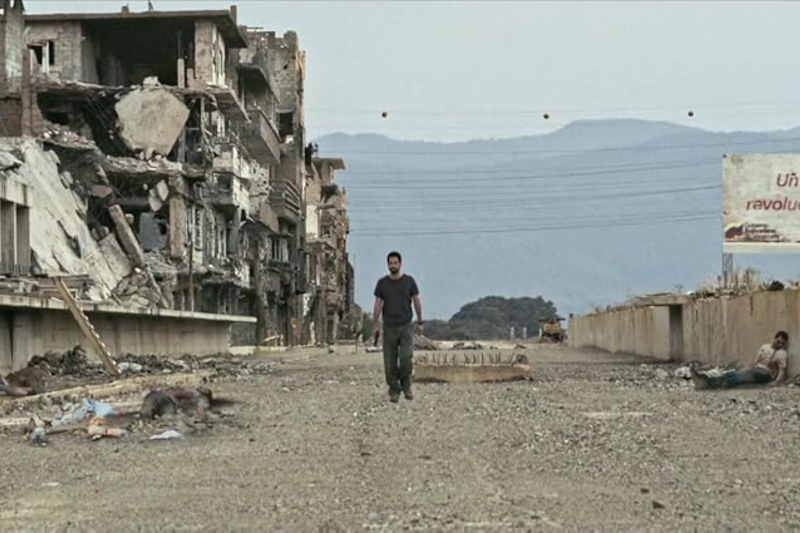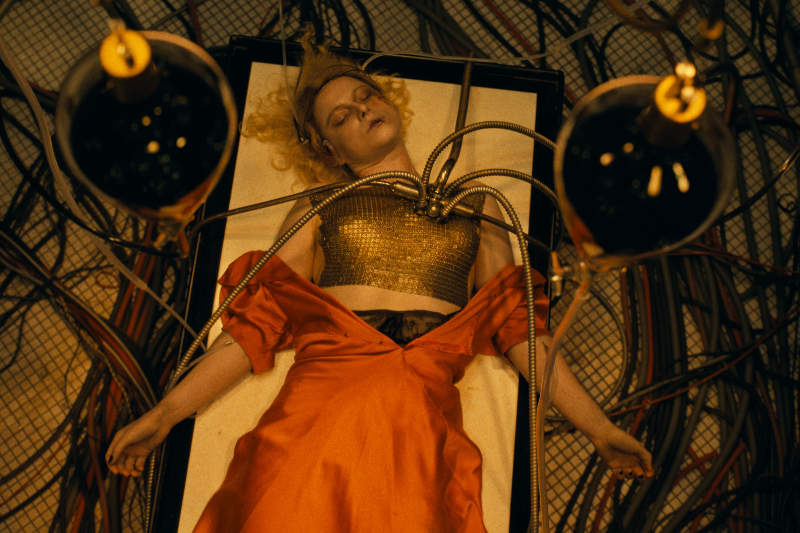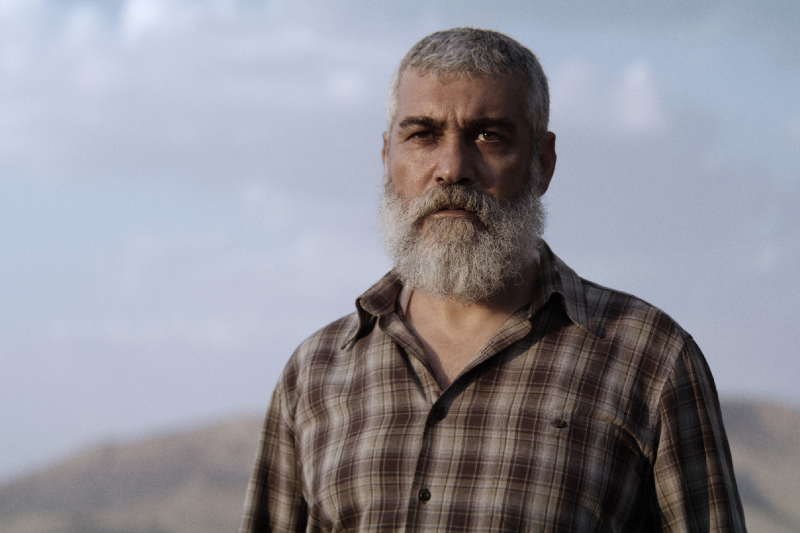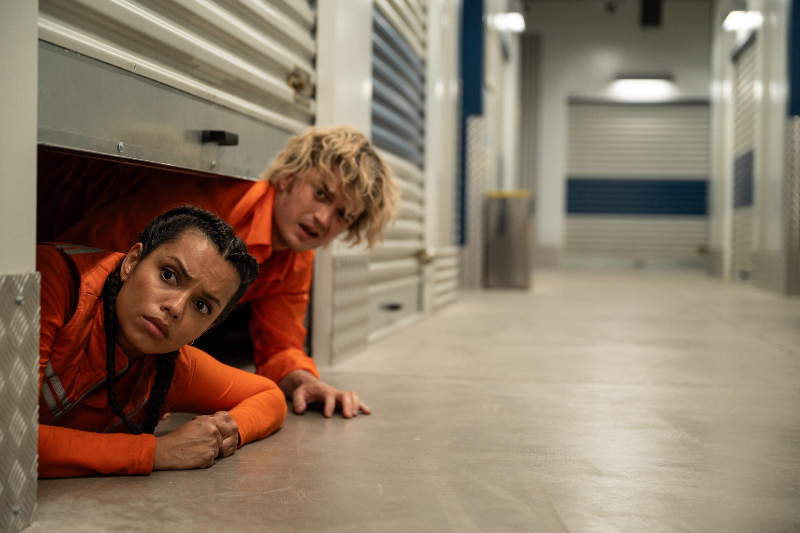A solitary man walks down the middle of a deserted road. To his right, a row of abandoned buildings stretches into the horizon, decrepit and hollowed out like an animal carcass in the desert. To his left, beyond a wooden fence that runs for miles, stands a faded billboard whose peeling but still legible words read: “An achievement of the Bolivarian Revolution.” Propped against the fence, beneath the sign and amongst the rubble of concrete and shattered plywood, lies a human corpse with a bloodied face and torso. The man keeps his gaze forward as he trudges on, unable to ignore but refusing to indulge in the images of death and destruction on either side of him. Apart from some scattered shrubs and the silhouette of the wooded Ávila mountains in the distance, he is the only sign of life in this desolate landscape.
If this scene, taken from Flavio Pedota’s Venezuelan film Infection, sounds conventional, that’s because it is. Someone who is shown the above image out of context might infer it’s from a documentary, or perhaps even a political thriller set in a war-torn country somewhere in the global south. At the same time, a person well-versed in genre iconography may recognize tropes within the frame — such as the conveniently propped corpses, or the protagonist’s staging the center with his back turned against the horizon — as classic markers of speculative fiction. Both would be right: Infection is a zombie flick, but flesh-eating monsters aside, its depictions of death and urban neglect feel frighteningly familiar.
Telling the story of Adam, a medical doctor who travels to Venezuela’s capital city of Caracas in search of his young son as a rabies outbreak spreads across the country, Infection is your standard action-thriller about the undead. It harbors a gritty aesthetic akin to the early seasons of The Walking Dead, great practical effects and all-around solid production value—all major accomplishments given the country’s economic constraints at a time when big-budget Hollywood blockbusters have set lofty standards for films of its genre.
However, the film’s biggest claim to fame is its not-so-subtle allegory for the country’s political and humanitarian crisis, which caused the country’s dictator, Nicolás Maduro, to suppress its domestic release. Rather than being mere bogeymen, Pedota’s zombies represent the masses dehumanized by Venezuela’s leadership, which has left the majority of its country's citizens impoverished and created the largest migratory crisis ever recorded in the Americas.
Although Venezuela recently made international headlines following another stolen presidential election, the country’s political and humanitarian crisis is not new, and has been going on for decades. The “Bolivarian Revolution” addressed by the billboard in Infection was a series of social reforms led by the president’s predecessor, Hugo Chávez, that resulted in temporary economic improvements for the country’s lower class during the early 2000s. In the 14 years he served as president however, Chávez became a controversial figure due to his seizure of the country’s major industries and his efforts to extend his tenure through constitutional reforms and democratic backsliding.
By the time Maduro took over in 2013, foreign sanctions, plummeting oil prices and reserves, unrestricted government spending and extreme hyperinflation had left the majority of Venezuelans impoverished. Maduro has since augmented his totalitarian control over the country by holding fraudulent elections, dissolving the government’s only opposition-controlled branch and enacting extrajudicial violence to quash public dissent.
Be it their “othering” of non-humans, or their stigmatization of the mob, dystopian and apocalypse narratives have garnered a reputation for espousing conservative ideals. This very western-centric view of the genre and its politics falters when applied to media from other corners of the world. As evidenced by Maduro’s lack of support among Venezuela's lower class, its socially progressive youth and the country’s opposition coalition (which is made up of right- and left-wing parties united by the common goal of restoring democracy), Venezuela’s problem is not its so-called socialism, but its totalitarianism. Therefore, as Adam races to find both his son and a cure for the virus with the help of various people he meets on the way to Caracas, Infection critiques the suppression of individual rights while also emphasizing the need for mutual aid and collective action in the fight against this epidemic.
Many moments in Infection convey the irony of the government’s dissonance with working class Venezuelans. The movie begins with the shot of a man standing at the top of a building, looking into the Caracas skyline. Though he is rendered an anonymous silhouette, we can make out the white construction helmet on his head, identifying him as a manual laborer, likely meant to serve the state. To his left is a line of identical buildings, all featuring the same wallscape image: a campaign motif depicting Chávez’s eyes, which was originally intended to convey a “protective” gaze over sympathizers, but has since garnered an Orwellian connotation. To his right is another building featuring graffiti that reads “Maduro dictator.” Later in the film, zombies break into a family’s home as a television set plays a public service announcement by the president, filmed from inside his private jet. “The revolution must go on, we survive and overcome,” the chyron reads as blood splatters onto the television set, implicating Maduro in the murder of innocent civilians.
Throughout the film, Pedota also incorporates archival footage documenting Venezuela’s humanitarian crisis, and recontextualizes it in a sci-fi/horror setting. News reports of the rapidly spreading virus are juxtaposed with videos and headlines of actual street manifestations, edited to look like they’re in response to the government’s inaction during the zombie epidemic. Fictional testimonies from immigrants who fled their native Venezuela following the outbreak are combined with real-life footage of caravans carrying refugees who seek to escape the country’s dictatorship. Characters reference food, water, gas and electricity shortages — trademarks of both the Chávez and Maduro regimes, and of speculative fiction set in the apocalypse.
Various interpretations can be mined from the zombies themselves. There is, of course, the potential for an anti-socialist reading that views the horde as an allegory for chavismo among the common masses, but that feels like a shallow analysis of the country’s socio-political situation, both in real life and in the movie. When the president speaks on television, he doesn’t address the zombies, nor does he even seem to acknowledge that there is an epidemic happening. Adam also forms alliances with strangers, emphasizing the need for mutual aid.
Also telling is Pedota’s decision to end the film with testimonies from Venezuelans in the diaspora who were cured of the virus but forced to migrate in the face of economic uncertainty. Their struggles to integrate are contrasted with the opinions of residents from neighboring countries, who callously argue amongst each other about whether or not their countries should be accepting refugees. Infected or not, these are people, the film seems to remind us. These are hardly conservative messages, which makes me inclined to view the monsters not as a condemnation of the masses, but a metaphor for their dehumanization under a regime that has left its constituents ailing, impoverished, and in some cases, depraved by their circumstances.
Despite falling prey to the Venezuelan censors, audiences were able to catch wind of Infection online, where it was lauded for its boldness and its sharp message. If nothing else, the Maduro administration’s frenzy upon the film’s release act as evidence of the horror genre’s capability to spotlight injustice and cause disruption — a lesson that bears repeating at a time when authoritarian rhetoric threatens the democracies of many countries around the world, including our own.






